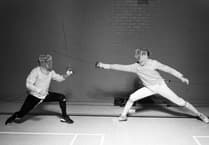Peters played for the Plymouth Club and the County from 1903.
However, his story started 23 years earlier, in 1880, when James Peters was born in Salford, the son of a Circus Lion Tamer, George Peters and who was tragically killed in a lions cage.
His mother, unable to cope, allowed Peters to join another circus troupe but, at the age of 11, whilst he was training as a bare back horse rider, he broke his arm and, being of no use to the circus, was left at a Children’s home in London.
He soon showed his all round prowess as an athlete and was hugely successful in whatever discipline he took on.
Whilst at school in London, Peters was introduced to both rugby and cricket and very soon excelled at both sports.
On leaving school he played for and captained various sports teams including the Greenwich Admirals Rugby League team.
He gained employment as an apprentice printer and in 1899, he moved to Bristol and joined the Bristol Rugby Club, where he enjoyed much success, before moving to Plymouth in 1903, where he worked as a carpenter at the dockyard and joined the Plymouth Rugby Club.
Peters’ abilities soon achieved recognition and it was not long until he was selected to play for Devon, making his debut for the County on November 7, 1903, in a 7-3 win against Gloucestershire.
In all he played 32 times for Devon, scoring 21 tries, 18 conversions, one penalty and a drop goal, the Johnny Wilkinson of his day.
On October 17, 1906, Devon played South Africa in Plymouth and Peters was selected at fly-half.
However, shortly before the kick off, the South Africans spotted Peters and refused to play.
So, why is this all so remarkable?
Well Jim Peters was a black man, hence the South Africans objection to him being in the Devon team.
Fearing a riot if the game did not go ahead, the South African High Commissioner and the Mayor of Plymouth intervened and the South Africans relented for the game to go ahead, with Peters playing.
Such was his form in the County Championship, the England selectors had no choice but to include Peters in the side and his England debut came on March 17, 1906, against Scotland and made five international appearances in total.
His debut brought mixed reviews in the press, so far as his rugby ability was concerned, though reports were very favourable.
Sadly, it was the colour of his skin that brought the less favourable comments such as the The Yorkshire Post wrote, “his selection is by no means popular on racial grounds”.
The following season, the opening England International was against the touring South Africans again who objected to him being selected and sadly, England caved in to the pressure and did not select him for the game.
Peters became somewhat disillusioned with the game and its politics and there were yet more twists in the tale as in 1910, in an accident at work he lost three fingers.
However, that did not end his rugby career and he continued to play at Plymouth until 1912 but again rugby politics reared its ugly head as he was found guilty of accepting money by way of expenses and banned by the RFU.
Ultimately, it was politics that drove him from rugby union and he accepted an offer to turn professional, travelling north to play for Barrow and then St Helens, before retiring from the game in 1914.
James Peters died in Plymouth on March 26, 1954.
He was indeed the first black player to play international rugby for England and it would be another 82 years before Chris Oti became the second.
The story of Jim Peters is widely known but probably seldom appreciated, a man who overcame hardships as a child but let his sporting prowess do the talking on the pitch.
He survived a career threatening injury but, in the end it was the politics of the Rugby Union that forced him out of the game.
Paul Harris





Comments
This article has no comments yet. Be the first to leave a comment.